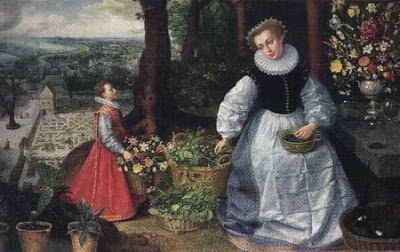Forming a diptych with Sonnet 15, Sonnet 16 explicitly puts forward the encouragement
of procreation where the previous Sonnet was seemingly lacking. The major
theme, aside from procreation itself is the Fair Youth's pretendedly oblivious
stance towards Time and its effects of atrophy.
The Sonnet begins with the conjunction "But," a clear continuation from Sonnet 15. Shakespeare is supplicating the Fair Youth why he is so torpid in the battle against Time. The imploring tone serves to highlight the dire gravity of the matter. As if to augment the ruinous state of affairs, the persona makes use of war imagery, "... bloody tyrant,...fortify yourself. " It's pretty incredible to note that the Fair Youth is willing to face a tyrant, a destroyer, a merciless ruiner. However, the hyperbole becomes apparent when the prescribed sentinel is procreation. Surely bearing offspring cannot absolutely make different one's life as alluded to by Shakespeare or can it?
Line 4 brings forward a rather rare form of diffidence as Shakespeare so easily belittles his own writing. Doubtless he knew his abilities but in this line so openly concedes they are worth nothing when pitted against Time. This act of humility is even more striking when one considers that Shakespeare often writes as a thoroughly observant demigod. So deeply sincere is the capitulation that an almost comical pun in "barren rhyme" ameliorates the concession. Howbeit, this may just be an extremely elaborate veneer meant to aid in convincing the Fair Youth to have children.
The second quatrain explores the fact that the Youth is in his prime and should thus have no difficulty in finding a partner with whom to bear children. Up to this point, Shakespeare seemed to be referring predominantly to a physical beauty and yet if "... many maiden gardens ...would bear you living flowers," the Fair Youth was probably a man of respectable social standing. The gardening images and references used in this quatrain are also worth noting especially as they seem to portray women as mere superabundant vessels of fertility waiting eagerly for seeds to bear children. A thoroughly misplaced maybe even offensive view of women though pretty conventional in Elizabethan times.
In the final quatrain, Shakespeare emphasises that no work of his or indeed any other artist can replicate the Fair Youth's beauty as seen by men. A notion which is possibly better interpreted in saying nobody can recreate life or youth should time work its irreversible magic.
As always the resolution is to have children but this particular Sonnet
has a bit of a twist in that; though slightly veiled, the person implies that
having children to tell of one's legacy ensure it is told in the way one
desires unlike having outsiders tell it. So best to bear offspring rather than
have photographs tell your story.
